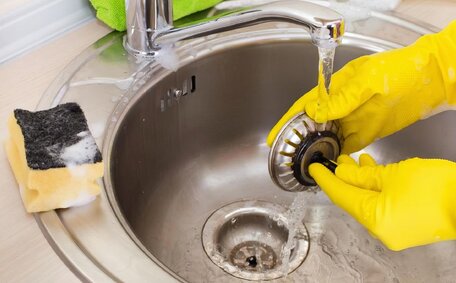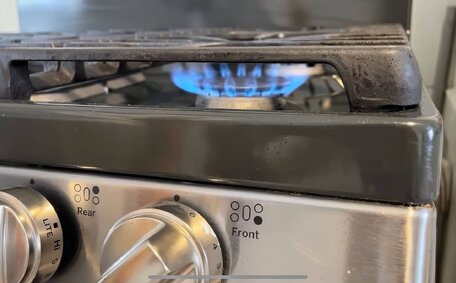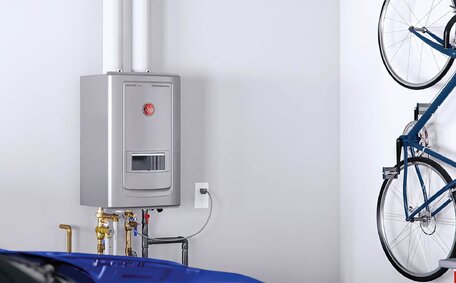What Causes Mould and Mildew Growth in Homes?
Excess moisture is the main cause of mildew and mould growth in homes. Bathrooms and kitchens are highly susceptible to mould and mildew due to humidity from showering, cooking, and hot water usage. Leaky pipes, dripping taps, and poor ventilation create environments conducive to mould and mildew, as they allow water to accumulate near potential food sources.
Clogged drains and poor drainage also significantly contribute to the problem. Water leaks from pipes, overflowing sinks, and condensation can seep into walls, floors, and other hidden areas, which can result in mildew growing. Trapped moisture frequently results in water damage, permitting conditions where mold mildew growing rapidly and spreading.
Kitchens require proper ventilation over the stove and sink areas.
To keep your bathroom fresh and moisture-free, it’s vital to have exhaust fans that effectively expel the humidity produced by steamy showers.
Air leaks from windows, doors, electrical outlets, and attic hatches contribute to the problem by allowing humid air to enter and condense. This moisture accumulation creates ideal conditions for expansive mold spore proliferation.
High indoor humidity sets the perfect stage for mold your surroundings to grow and thrive. Preventing mold effectively involves ensuring that your indoor relative humidity lies between 30-50%.
Neglected, mould can spread to walls, ceilings, carpets, and furniture, dampening your living space. Your local plumber can help identify and remedy plumbing issues that cause a moisture problem leading to mould infestations.
How Plumbing Issues Can Lead to Mould
Water seeping through leaks in pipes, taps, toilet cisterns, and other fixtures can accumulate, wreaking havoc in concealed sections of the pipe drain system, leading to mould damp conditions. These situations can result in damp conditions that encourage mould and mildew in your home.
Visible surface mould may signify a more serious infestation already established within your pipes where mould can hide.
Showerheads and taps that leak or drip constantly add to humidity levels. Addressing defective installations and inadequate waterproofing around showers and baths is crucial to prevent mould propagation from moisture seeping into adjacent areas.
Blocked drains can cause sewer backups, pushing water into areas it should not be, thereby exacerbating mould issues.
Addressing these plumbing problems is crucial to effectively combat mould within your property. Left unchecked, the fungus can cause structural damage to walls, flooring, woodwork and gradually undermine structural integrity.
Conducting regular plumbing inspections with a qualified plumber is the best way to ensure there are no unaddressed issues that could lead to mold mildew. Fixing problems like leaks and improving ventilation removes moisture sources fuelling mold mildew your bathroom issues. Routine plumbing upkeep can prevent mold mildew your bathroom and the damp conditions favourable to mould.
Health Risks of Exposure to Mould
Mould exposure poses serious health risks, especially for vulnerable groups such as children, the elderly, and those with respiratory conditions. Leaks can release mould spores and irritants into the air, potentially triggering allergic reactions, asthma attacks, and other respiratory difficulties that may harm your health.
Chronic exposure can be more than just an irritant; it is associated with long-term respiratory diseases. Common symptoms include wheezing, coughing, chest tightness, sore throat, and sinus congestion. Beware that mould contact could exacerbate current health conditions such as COPD, pneumonia, and chronic bronchitis, leading to significant health effects.
Those with compromised immune systems are at higher risk of developing fungal infections in their lungs from mould spores. In rare cases, certain moulds release toxins called mycotoxins that cause health issues such as headaches, fever, and shortness of breath.
Children are particularly vulnerable to illnesses where mold mildew can impact due to their developing lungs and less mature immune system. The elderly also face greater risk due to their generally weaker immune function.
For some people, it’s critical to address any sources of moisture your home may encounter and plumbing issues leading to mold growth early. Preventing exposure protects your family’s health and avoids the need for costly remediation later.
Signs of a Mould Problem
An ongoing musty, earthy scent serves as a clue, smells your home can emanate when experiencing mould, intensifying often when cooking, hinting at its presence. You may notice the smell intensifies after showering or cooking due to the spike in humidity. Sniff around for the source of the smell, which likely indicates mould is in the vicinity.
Increased health issues such as respiratory problems, sinus congestion, runny noses, eye irritation, and headaches among family members can also indicate mould exposure. Pay attention if symptoms worsen in certain rooms or areas of the home.
If you observe any of these signs, what do you do when they occur? Call plumber in Melbourne immediately to inspect your plumbing system. They can identify and fix issues like leaks that are enabling mould growth. The sooner you address excess moisture, the easier it will be to get rid of mould soon and avoid it spreading further in the home.
Don’t ignore these warnings - act quickly at the first signs of mould. Catching mould your house early before major growth occurs will help avoid extensive remediation work and dangerous health consequences.
How Plumbers Identify and Treat Mould Issues
To hinder mold which after all your residence might struggle with, the process generally starts with a comprehensive evaluation by a professional plumber. They will check for any visible mould growth and investigate the property for leaks, humidity levels and drainage problems that may be contributing to mould formation.
Using moisture metres and infrared cameras, plumbers can locate moisture in walls, floors and other concealed areas. They will pay particular attention to wet rooms such as bathrooms, kitchens, basements and any spaces prone to dampness.
If leaks or plumbing defects are discovered, the plumber will repair issues like cracked pipes, leaky taps and faulty shower installations. Improving ventilation is also key when your home requires it, so they may install or upgrade exhaust fans to effectively remove humidity.
Plumbers offer various treatments for existing bathroom mould issues. Surface infestations are often manageable with a service product treatment boasting detergents or antimicrobial agents. They may use special vacuums with HEPA filters to remove spores and prevent Spreading mould through your living space.
For severe cases, containing and removing contaminated building materials may be necessary. Plumbers can access wall cavities and other restricted spaces to remediate mould spread.
Through regular plumbing service maintenance, plumbers ensure systems remain leak-free and well-ventilated, which is the best prevention solution. With their expertise in identifying and resolving moisture issues, plumbers are well equipped to diagnose and tackle mould problems.
DIY Mould Removal Tips
For minor mould issues, there are some basic DIY methods you can try before calling in professional help:
- First, fix any moisture sources such as leaks or humidity to prevent the mould returning. Ensure the area has adequate ventilation.
- Protect yourself by wearing gloves, goggles and a face mask. Open windows to ventilate the room.
- For sparkling shower curtains or tiles, mix equal parts white vinegar and water in a spray bottle. Leave for 1 hour before scrubbing and rinsing.
- On porous surfaces like drywall or wood, use a borax solution - 1 cup borax per 4 litres of hot water. For stubborn mould, pouring boiling water down the drain before scrubbing may prove more effective.
- For stubborn mould, consider a cup baking soda mixed with 5 cups of boiling water. Apply and let sit overnight before scrubbing.
- Be sure to establish a dry area completely after cleaning to discourage regrowth.
- Discard any materials like carpet or insulation that remain contaminated after cleaning.
For severe cases or removing mould in hard to reach spots, always call your emergency plumber. DIY removal can inadvertently spread spores and expose you to health risks. Licenced plumbers have the expertise, protective gear, and tools to fully eliminate mould, mitigate health risks, and stop it coming back.
Ensure the area has adequate ventilation.Protect yourself by wearing gloves, goggles and a face mask. Open windows to ventilate the room.Professional Mould Remediation
When mould growth becomes extensive, professional remediation is often the best solution. Experienced plumbers like Pennant Hills Plumbing have specialised equipment and proven techniques to thoroughly treat mould infestations.
Testing confirms the suitability of remediation methods. For mild surface mould, scrubbing and biocide application may suffice.
For toxic varieties like black mould, full containment and removal of contaminated materials is needed. Plumbers can identify the specific type mould present as not all mould is toxic.
Plumbers employ industrial-grade vacuums with HEPA filters to clean mould. This prevents spores spreading throughout the home during the process. They seal off the affected area and may erect containment tents with negative air pressure to safely remove mould.
Accessing concealed spaces like wall and ceiling cavities to treat mould is a key benefit. Plumbers can remediate mould in places homeowners can’t reach. They inspect adjoining areas to ensure no traces remain.
Prevention is also a constant focus. Plumbers fix underlying moisture issues, improve ventilation, treat affected materials with antimicrobials, and apply protective surface coatings. This comprehensive approach stops mould regrowing.
Equipped with experience, protective gear, and technical skills, plumbers provide safe and effective mould remediation. Their expertise removes mould and prevents hazardous exposure, safeguarding the integrity your home and the health of its occupants.
Preventing Future Mould Growth
There are several effective measures homeowners can take to prevent mould regrowth after remediation:
- Maintaining proper ventilation, particularly in bathrooms, can control mildew in your home. Employ the exhaust fan during and after using your shower, and keep the bathroom door ajar after use.
- Install and regularly clean dehumidifiers to regulate indoor humidity. Maintain indoor relative humidity below 50%.
- Promptly fixing moisture issues can prevent them from escalating into serious plumbing problems. Prevent water accumulation by repairing fittings and sealing tile grout.
- Clean and disinfect any damp areas frequently to discourage mould growth. Use a solution of 1 cup bleach to 4 litres of water.
- Enhance airflow by periodically opening windows to let in fresh air. Don’t let rooms become stagnant.
- Clean window frames, sills and air vents regularly to remove condensation buildup.
- Ensure appliances like stoves, dryers and air conditioners are properly vented outside.
- Add mould-inhibiting paints or coatings to frequently affected areas like bathroom walls.
- Keep gutters and drainage areas clear to channel water away from the homes foundation.
Regular professional plumbing inspections can identify moisture issues early, preventing mould recurrence. Contact your local Pennant Hills Plumbing to schedule maintenance checks and keep your plumbing optimised against mould risks.
With vigilance, prompt action, and the support of expert plumbers, you can keep your home mould-free and protect your family’s health from hazardous exposure.






